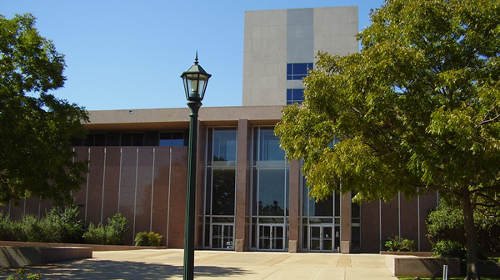BY CHRIS JOHNSON, WASHINGTON BLADE

Supreme Court of Texas has ruled no established right exists for extending benefits to same-sex couples. Photo public domain
Despite the U.S. Supreme Court extending marriage equality nationwide — and a recent declaration from justices affirming that decision — the Texas Supreme Court on Friday ruled against spousal benefits for married same-sex couples. Writing for the court, Justice Jeffrey Boyd determined the 2015 decision in Obergefell v. Hodges "is not the end" on the same-sex marriage issue and state workers have no established right to obtain benefits, such as health insurance, for their same-sex spouses in the same way as other employees. "The Supreme Court held in Obergefell that the Constitution requires states to license and recognize same-sex marriages to the same extent that they license and recognize opposite-sex marriages, but it did not hold that states must provide the same publicly funded benefits to all married persons, and — unlike the Fifth Circuit in De Leon — it did not hold that the Texas DOMAs are unconstitutional," Boyd writes. The 24-page ruling instructs a trial court — which had determined prior to the Obergefell ruling the state need not afford benefits to married same-sex couples — to re-examine the issue under the guidance that the DeLeon decision, a federal case that overturned the Texas same-sex marriage ban, doesn't bind the court. "We hold that the Fifth Circuit's decision in De Leon does not bind the trial court on remand, and the trial court is not required to conduct its proceedings 'consistent with' that case," Boyd writes. Further, the Texas Supreme Court reverses the judgment of the Texas 14th Court of Appeals that overturned the trial court's decision.
The case was filed by Jack Pidgeon and Larry Hicks after former Houston Mayor Annise Parker, a lesbian, instructed her city to provide spousal benefits to city employees in same-sex marriages after the Supreme Court's 2013 ruling against the anti-gay Defense of Marriage Act. Jack Pidgeon and Larry Hicks contended state law, which at the time barred same-sex marriage, prevented Parker from taking that action. The Texas Supreme Court decision seems to fall short of outright denying spousal benefits for married same-sex couples and instead remands the case to a trial court for reconsideration of the issue. The Texas Supreme Court also vacates the trial court's decision barring Houston from granting spousal benefits.
The court's ruling comes in the same week the U.S. Supreme Court issued a ruling in Pavan v. Smith affirming marriage equality nationwide, overturning an Arkansas Supreme Court decision upholding a state law against placing both lesbian parents' names on the birth certificates of their children. Boyd writes the Pavan decision demonstrates "the Supreme Court has taken one opportunity to address Obergefell's impact on an issue it did not address in Obergefell, and there will undoubtedly be others." That's incorrect. The U.S. Supreme Court took up the case only after the Arkansas Supreme Court issued the ruling contrary to to the Obergefell decision.
The U.S. Supreme Court also said Obergefell explicitly addressed the birth certificate issue, citing plaintiffs who were seeking to place their names on their children's birth certificates. The Obergefell ruling, the U.S. Supreme Court concluded, guarantees same-sex couples the constellation of benefits under marriage. Kenneth Upton Jr., senior counsel in Lambda Legal's Dallas-based South Central Regional Office, said the Texas Supreme Court decision is similarly contrary to the principles of the Obergefell ruling. "This absurd contortion of the Obergefell ruling defies all logic and reason, especially in light of the Supreme Court's explicit ruling on Monday that marriage is marriage and equal is equal," Upton said. "We will take steps to protect these families."
Eric Lesh, fair courts project director at Lambda Legal, said the ruling from the Texas Supreme Court — which is made up of justices who are elected rather than appointed — demonstrates a judiciary made up of elected justices is inadequate. "This decision is political and is an example of why elected judges are bad for LGBT people and bad for judicial independence," Lesh said. Also condemning the Texas Supreme Court was GLAAD CEO Sarah Kate Ellis, who said the ruling demonstrates marriage equality isn't safe. "The Texas Supreme Court's decision this morning is a warning shot to all LGBTQ Americans that the war on marriage equality is ever-evolving, and anti-LGBTQ activists will do anything possible to discriminate against our families," Ellis said. "In the age of the Trump administration, which continues to systematically erase LGBTQ Americans from the fabric of this nation, the LGBTQ community and our allies must remain visible and push back harder than ever against attacks on acceptance."










